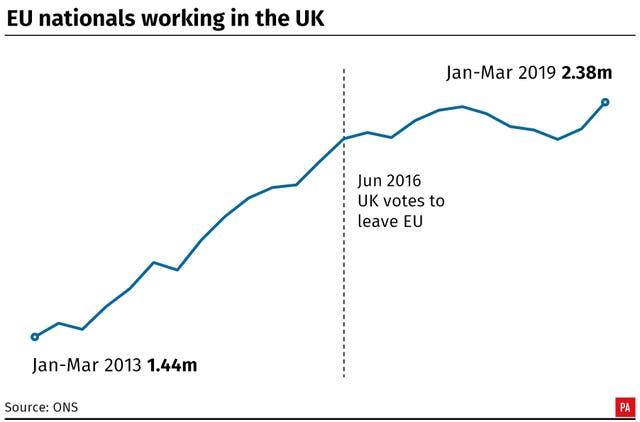
The number of EU workers in the UK has jumped by nearly 100,000 to a new record high, official statistics have revealed.
Around 2.38 million EU nationals were employed in the UK from January to March, 98,000 more than in the equivalent period of 2018.
Compared with the first three months of 2016 – shortly before the Brexit vote in June of that year – the figure was up by 237,000.

Employment data from the Office for National Statistics (ONS) also showed the number of workers from outside the EU increased to the highest on record.
In January to March 2019, there were an estimated 1.32 million non-EU nationals working in the UK, 80,000 more than for a year earlier.
The ONS report said: “Since January to March 2009, the number of non-UK nationals from outside the EU working in the UK has been broadly flat.
“In contrast, the number of non-UK nationals from the EU working in the UK has generally increased, reflecting the admission of Poland and other East European countries to the EU in 2004.”
Today we’ve published the UK’s latest labour market figures https://t.co/YghuRjThgU
— ONS (@ONS) May 14, 2019
Romanians and Bulgarians accounted for much of the year-on-year rise in EU workers, with an estimated 423,000 nationals of the two eastern European countries employed in the UK in the first three months of this year – up by 70,000 compared with January to March 2018.
Around 925,000 people working in the UK in the latest quarter were from EU8 nations that joined the bloc in 2004 – the Czech Republic, Estonia, Hungary, Latvia, Lithuania, Poland, Slovakia and Slovenia – while just over one million were from 14 long-term EU member states including Germany, Italy, Spain and France. Both of these figures were up slightly on the previous year.
Separate net migration figures have sparked claims of a “Brexodus” since the 2016 vote, but the ONS stressed that the employment estimates published on Tuesday do not measure flows of recent migrants to the UK.
Jonathan Portes, professor of economics at King’s College London, said: “It is possible that recent developments have provided some assurance that, at least in the short term, little is likely to change for EU citizens resident in the UK.
“Over the past year, the increase in workers born outside the UK accounts for just over half the net growth in employment, showing that immigration continues to be essential to the UK economy.”
Alp Mehmet, vice chairman of Migration Watch UK, said: “As parliament dithers over Brexit and public trust in politicians reaches a new low, the Government must start to rebuild the faith of voters by taking serious steps to reduce immigration by a significant amount.”
In December, ministers presented plans for the biggest shake-up of the immigration regime for more than 40 years.
Under the proposed “skills-based” system, a new temporary work route will be created, the annual cap on skilled work visas will be scrapped, and employers wanting to sponsor overseas employees will no longer be required to carry out a “resident labour market test”.


Comments: Our rules
We want our comments to be a lively and valuable part of our community - a place where readers can debate and engage with the most important local issues. The ability to comment on our stories is a privilege, not a right, however, and that privilege may be withdrawn if it is abused or misused.
Please report any comments that break our rules.
Read the rules hereLast Updated:
Report this comment Cancel